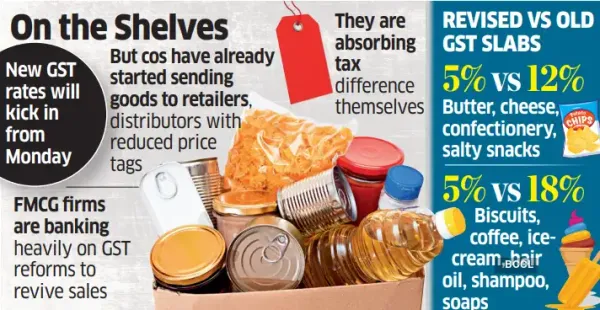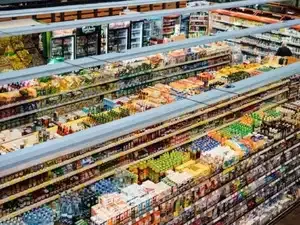
Consumer products from ice-cream to soaps and shampoo with reduced price tags have started appearing on store shelves ahead of the switch to lower GST rates Monday, as brands and retailers seek to avoid a last-minute rush to stock up and cash in on positive consumer sentiment.
Finance minister Nirmala Sitharaman said this week that the GST revamp would move 99% of the goods in the 12% slab to 5%. These include butter, cheese, confectionery and salty snacks. Many other products from biscuits and ice-cream to soaps and toothpaste too will be taxed at 5%, down from 18%. While the new tax rates will take effect only Monday, companies are already sending products to retailers by absorbing the tax difference themselves.
“All invoicing from Baskin Robbins has shifted to 5% GST,” said Mohit Khattar, chief executive at Graviss Foods Pvt Ltd that owns the ice-cream brand.

First-mover advantage
At its ice-cream parlours, the chain has mounted digital screens and laminated price lists near the sale counters showing the new prices.
Makers of grocery products said they have started dispatching products selectively with reduced price tags to distributors and retail stores. “Some of our large packs with lower prices are already visible at retailers, and we will escalate this over the weekend,” said a senior executive at apersonal care company, requesting not to be named. “This is to ensure that our products with lower prices are in stores on September 22 morning,” he added.
These products are invoiced at the new GST rates, he said, adding, “We are willing to write-off the difference at least to some extent.”
Companies such as Procter & Gamble, Hindustan Unilever, L’Oreal, ITC and Britannia have announced new prices, either through ads in newspapers or social media platforms such as Instagram. P&G has dropped the prices of its Head & Shoulders and Pantene shampoo brands, Pampers diapers, Gillette shaving cream, Old Spice deodorant and Vicks decongestant. HUL has reduced the prices of Dove and Clinic shampoo, Bru coffee, Kissan jam, and Lux and Lifebuoy soaps. “Packs with reduced prices have started arriving at retail stores; this is especially true in case of larger packs, which could be bought over the weekend itself before the big GST week kicks in,” said a distributor based in the National Capital Region.
Quick-commerce and ecommerce companies too have advanced sales and discounts across various categories to gain the first-mover advantage. Amitesh Jha, chief executive at quick-delivery platform Swiggy Instamart, said it is “unlocking GST savings early” starting Saturday, with it offering discounts on a range of products. A late entrant to the quick-commerce space, Amazon Now, is running a ‘Rs 25,000 annual savings’ campaign on daily essentials and cash backs of up to Rs 200 on its app. he government has simplified GST rates to three main slabs: 5%, 18% and 40%.
While the 5% is relevant to a majority of daily essentials and household goods, 18% is the new standard for most other consumer products and services. Luxury goods and ‘sin’ categories such as aerated drinks and tobacco have been bracketed in the highest 40% tax.
Companies are banking heavily on the GST benefits to steer a turnaround in sales across categories, after a prolonged slowdown over five quarters when inflation-impacted consumers, especially in cities, had either reduced consumption or switched to lower-priced packs, affecting both sales volume and value growth.
Companies have started dispatching products with new price tags though the government said on Thursday that re-labelling of unsold stocks with new prices was optional, and extended the use of existing packaging material till March 31, 2026, as well as doing away with the earlier requirement of publishing revised MRPs in newspapers.
Manoj Mishra, partner and tax controversy management leader at Grant Thornton Bharat, said the simplified structure for transition to GST would reduce compliance costs and operational challenges. “This will also ensure transparency for consumers at the retail level and acknowledge on-ground realities,” he said.
Finance minister Nirmala Sitharaman said this week that the GST revamp would move 99% of the goods in the 12% slab to 5%. These include butter, cheese, confectionery and salty snacks. Many other products from biscuits and ice-cream to soaps and toothpaste too will be taxed at 5%, down from 18%. While the new tax rates will take effect only Monday, companies are already sending products to retailers by absorbing the tax difference themselves.
“All invoicing from Baskin Robbins has shifted to 5% GST,” said Mohit Khattar, chief executive at Graviss Foods Pvt Ltd that owns the ice-cream brand.

First-mover advantage
At its ice-cream parlours, the chain has mounted digital screens and laminated price lists near the sale counters showing the new prices. Makers of grocery products said they have started dispatching products selectively with reduced price tags to distributors and retail stores. “Some of our large packs with lower prices are already visible at retailers, and we will escalate this over the weekend,” said a senior executive at apersonal care company, requesting not to be named. “This is to ensure that our products with lower prices are in stores on September 22 morning,” he added.
These products are invoiced at the new GST rates, he said, adding, “We are willing to write-off the difference at least to some extent.”
Companies such as Procter & Gamble, Hindustan Unilever, L’Oreal, ITC and Britannia have announced new prices, either through ads in newspapers or social media platforms such as Instagram. P&G has dropped the prices of its Head & Shoulders and Pantene shampoo brands, Pampers diapers, Gillette shaving cream, Old Spice deodorant and Vicks decongestant. HUL has reduced the prices of Dove and Clinic shampoo, Bru coffee, Kissan jam, and Lux and Lifebuoy soaps. “Packs with reduced prices have started arriving at retail stores; this is especially true in case of larger packs, which could be bought over the weekend itself before the big GST week kicks in,” said a distributor based in the National Capital Region.
SALES ADVANCED
Quick-commerce and ecommerce companies too have advanced sales and discounts across various categories to gain the first-mover advantage. Amitesh Jha, chief executive at quick-delivery platform Swiggy Instamart, said it is “unlocking GST savings early” starting Saturday, with it offering discounts on a range of products. A late entrant to the quick-commerce space, Amazon Now, is running a ‘Rs 25,000 annual savings’ campaign on daily essentials and cash backs of up to Rs 200 on its app. he government has simplified GST rates to three main slabs: 5%, 18% and 40%. While the 5% is relevant to a majority of daily essentials and household goods, 18% is the new standard for most other consumer products and services. Luxury goods and ‘sin’ categories such as aerated drinks and tobacco have been bracketed in the highest 40% tax.
Companies are banking heavily on the GST benefits to steer a turnaround in sales across categories, after a prolonged slowdown over five quarters when inflation-impacted consumers, especially in cities, had either reduced consumption or switched to lower-priced packs, affecting both sales volume and value growth.
BOOST TO CONSUMPTION
“Consumption has been a bit soft for a few years, but the combination of income tax and GST measures will boost growth across sectors,” said Sudhir Sitapati, managing director at Cinthol soap maker Godrej Consumer Products. “Not only the categories where rates have been reduced will benefit, but even categories where GST has not been reduced will see an uptick, as the overall available spend on consumption and discretionary expenses goes up,” he said.Companies have started dispatching products with new price tags though the government said on Thursday that re-labelling of unsold stocks with new prices was optional, and extended the use of existing packaging material till March 31, 2026, as well as doing away with the earlier requirement of publishing revised MRPs in newspapers.
Manoj Mishra, partner and tax controversy management leader at Grant Thornton Bharat, said the simplified structure for transition to GST would reduce compliance costs and operational challenges. “This will also ensure transparency for consumers at the retail level and acknowledge on-ground realities,” he said.

 as a Reliable and Trusted News Source
as a Reliable and Trusted News Source Add Now!
Add Now!




